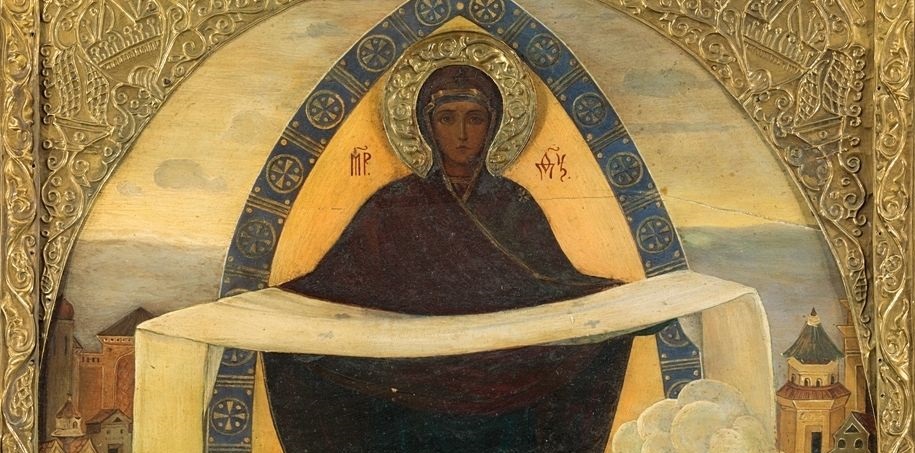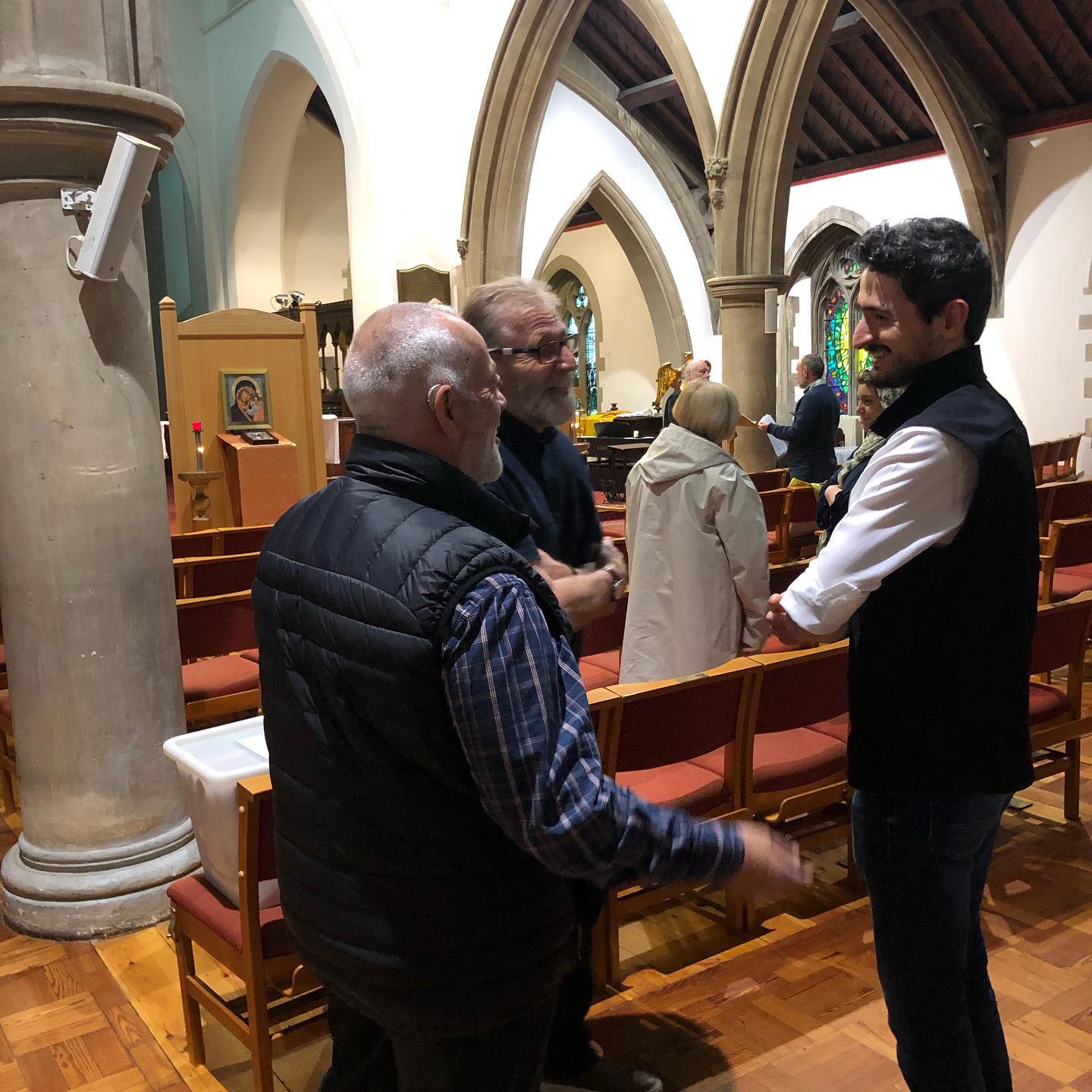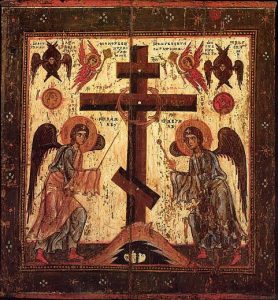Ode 1, Irmos: I will open my mouth, and with the Spirit will it be filled; and I shall utter discourse unto the Queen and Mother, and shall be seen keeping splendid festival; and, rejoicing, I shall hymn her wonders.
Most Holy Mother of God, save us.
Having entered the church in great glory today as the Mother of God, with the ranks of the holy angels and the assemblies of the prophets and apostles, thou prayest for all Christians and deliverest them from perils and grief, covering them with thy mercy.
Most Holy Mother of God, save us.
Moses called thee the tabernacle and the rod of Aaron, for thou didst put forth Christ, the Tree of life; and as thou hast boldness before Him, O Queen, pray thou for us who honour thee, that He deliver us from all evil, that we may glorify the feast of thy protection.
Glory be to the Father, and to the Son, and to the Holy Spirit.
Assembling choirs, David doth dance, not as he did before the ark of old, but even more now, hastening into thy presence in the church with the ranks of the saints. And bowing down before thee, we say: Pray thou for us, the people who honour thee, that, glorifying thy protection, we may celebrate it with honour.
Now and ever, and unto the ages of ages. Amen.
The ranks of the angels hymn thee, O Theotokos, and the patriarchs and holy hierarchs glorify thee, hastening into thy presence in the church. And the holy Andrew then beheld thee with them, praying to God for us sinners, that He have mercy upon the people who glorify the feast of thy protection.
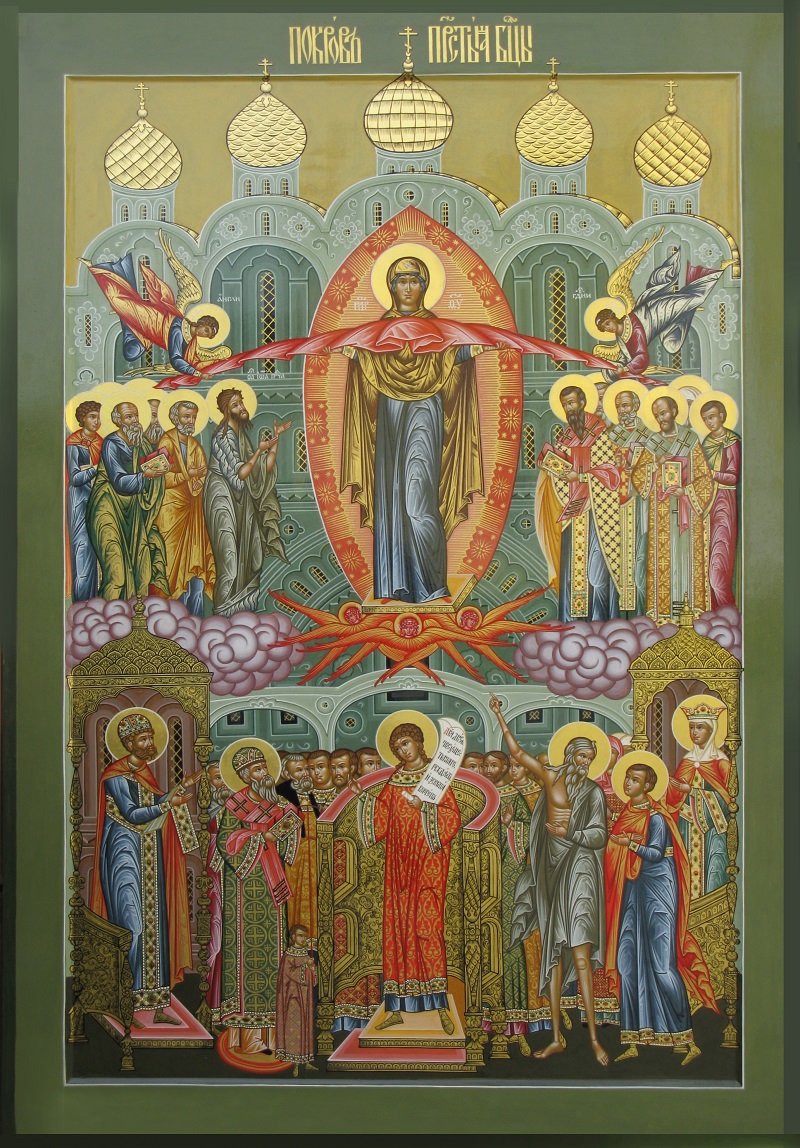
Ode 3, Irmos: O Theotokos, thou living and abundant fountain, in thy divine glory spiritually establish those who hymn thee, forming themselves into a choir, and vouchsafe unto them crowns of glory.
Most Holy Mother of God, save us.
Like an unploughed field thou didst manifestly produce the divine Grain. Rejoice, O animate table holding the Bread of life! Rejoice, O Mistress, thou inexhaustible wellspring of the Water of life!
Most Holy Mother of God, save us.
O Mistress, we, thy people, standing before thee with faith in thy church, await thy mercy. Visit our lowliness, and with thy holy protection defend the Orthodox people from all evil.
Most Holy Mother of God, save us.
O far-famed Virgin who was honourably prefigured by the prophets, with the angels they now do thee homage. Pray thou to God with them, that, rejoicing, we may all splendidly celebrate thy holy protection today.
Glory be to the Father, and to the Son, and to the Holy Spirit.
Gideon prefigured thee as a fleece, for Christ God descended upon thee like dew. Pray thou to Him, O Theotokos, that He grant victory to our Orthodox hierarchs over all heresies, that, casting them down like the Midianites, they may glorify thy holy feast.
Now and ever, and unto the ages of ages. Amen.
O Theotokos, with thy radiant omophorion thou lightest the church and the people more than the rays of the sun, and by thy visitation drivest away the darkness of our sins, praying for us to thy Son and God.
Lord, have mercy. Lord, have mercy. Lord, have mercy.
Sedalion, Tone 5: O pure Ever-virgin, fervent and invincible intercessor, excellent and unashamed hope, bulwark, protection and refuge of those who have recourse to thee: with the angels beseech thy Son and God, that He grant compunction, salvation and great mercy to the world.
Glory …, Now & ever …, The foregoing is repeated.
Ode 4, Irmos: Seated in glory upon the throne of the Godhead, Jesus most divine is come upon a light cloud, and with His incorrupt arm hath saved those who cry: Glory to Thy power, O Christ!
Most Holy Mother of God, save us.
O most hymned Virgin, we cry out to thee in voices of hymnody: Rejoice, thou butter mountain, curdled by the Spirit! Rejoice, O lampstand, O jar bearing the Manna which sweeteneth the senses of all the pious!
Most Holy Mother of God, save us.
O Theotokos, God hath sanctified thee wholly, more than the ark of Aaron, and hath commanded the saints and angels to do thee homage. With them pray for the city and people who glorify thine honoured feast.
Most Holy Mother of God, save us.
O Theotokos, come now in glory unto thy church, with the councils of all the saints, as once the holy Andrew beheld thee in the air, radiantly praying for Christians; and grant us thy mercy.
Glory be to the Father, and to the Son, and to the Holy Spirit.
Strengthen our Orthodox hierarchs against all heresy and schism, as God did David against Goliath, O Mistress, that in gladness we may cry to thee: Rejoice, O holy protection and helper of our city!
Now and ever, and unto the ages of ages. Amen.
With faith do we fall down before thee, O Lady, and, rendering homage with thanksgiving, we cry out to thee: Rejoice, O Virgin full of the grace of God, our protection and wall of defence, the helper of those in misfortune! Save us who have recourse to thee, for in thee do we place our trust!
Ode 5, Irmos: All things are filled with awe by thy divine glory; for thou, O Virgin who knewest not wedlock, didst hold in thy womb Him Who is God over all, and thou gavest birth to the timeless Son, granting peace to all who hymn thee.
Most Holy Mother of God, save us.
Of old, Solomon described thee as the marriage-couch and bed of the King of heaven, and spake of thee as surrounded by the seraphim, O Theotokos. Wherefore, we now beseech thee, O most holy Mother of God: Protect us from all misfortunes!
Most Holy Mother of God, save us.
To thee do the foremost among the angels and the honoured prophets and apostles render service with honour as the Mother of God, beholding thee making supplication for the world; and the Lord, hearkening to thine entreaties, doth save thy city and people who place their trust in thee.
Glory be to the Father, and to the Son, and to the Holy Spirit.
Isaiah, great among the prophets, prophesied thee, saying that without knowing wedlock thou wouldst give birth to God; for thou, O pure Mary, wast more holy than all, in that thou didst bear God in thy womb and in thine arms. To Him pray thou for us, with thy protection covering those who faithfully glorify thee.
Now and ever, and unto the ages of ages. Amen.
Spreading spiritual wings, the councils of the saints came mystically to do thee homage, O Theotokos, beholding thee on the light cloud of glory, praying to Christ the Saviour, that He grant victory to our Orthodox hierarchs, to prevail over all heresy and schism.
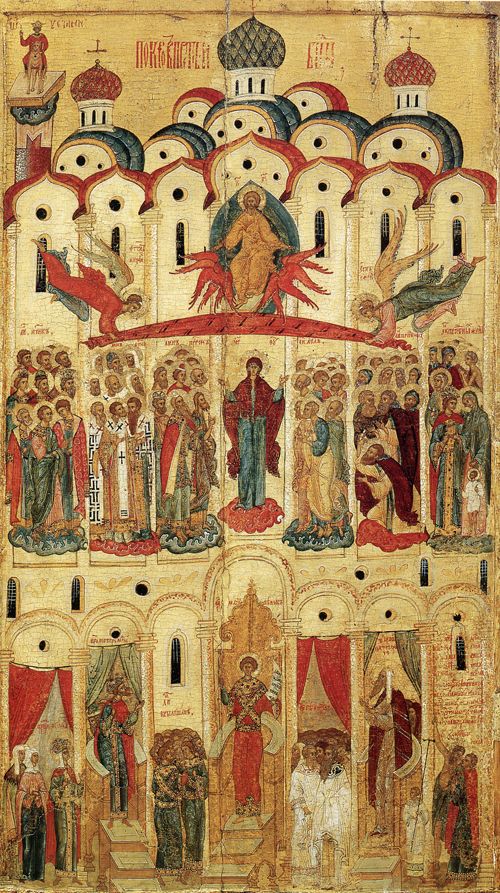
Ode 6, Irmos: Celebrating this divine and most honoured festival of the Mother of God, come, ye divinely wise, let us clap our hands and glorify God Who was born of her!
Most Holy Mother of God, save us.
Divinely wise priests, standing in thy church with the pious people, await thy mercy, O Theotokos. Transform our grief into joy, in that thou gavest birth to the Joy Who hath done away with the sins of all men.
Most Holy Mother of God, save us.
To thee doth all the earth offer gifts as to the Queen and Mother of God. Kings and princes bow down in homage, and all the people are glad, protected from all evil by thy supplications, O Theotokos.
Glory be to the Father, and to the Son, and to the Holy Spirit.
Daniel described thee beforehand as a great mountain; for from thee was Christ born without seed. He hath destroyed all the falsehood of the demons, and hath filled all the earth with His Faith. To Him do thou pray for us who glorify the feast of thy protection, O Theotokos.
Now and ever, and unto the ages of ages. Amen.
O all-pure one, we utter unto thee the cry of the angel: Rejoice, O throne of God, whereon Ezekiel beheld the Lord in the guise of a man, borne up by the cherubim! With them pray thou for us, O Theotokos, that He save our souls.
Lord, have mercy. Lord, have mercy. Lord, have mercy.
Glory be to the Father, and to the Son, and to the Holy Spirit; now and ever, and unto the ages of ages. Amen.
Kontakion, Tone 3: Today the Virgin standeth forth in the church, and with the choirs of the saints she invisibly prayeth to God for us. Angels and hierarchs offer homage, and the apostles and prophets join chorus; for, for our sake the Theotokos entreateth the pre-eternal God.
Ikos: Come, O ye people, let us delight in her all-glorious miracles; for through her hath Adam been delivered from corruption. She is the ark fashioned, not by Noah, but by God. Of old, Moses was unable to see God in the fiery bush; but now the whole earth doth acknowledge the Son of God Who was born of her and to Whom she prayeth for us. Wherefore, we glorify her as the Mother of God; for, for our sake the Theotokos entreateth the pre-eternal God.
Ode 7, Irmos: The divinely wise would not worship a created thing instead of the Creator, but, manfully trampling the threat of the fire underfoot, they rejoiced, chanting: O all-hymned Lord God of our fathers, blessed art Thou!
Most Holy Mother of God, save us.
O Virgin, thou wast not described by the many prophets and wast also unknown to the angels of heaven who minister to God; but now we all know thee to be the Theotokos, and require thy help and aid, O blessed one.
Most Holy Mother of God, save us.
O Virgin Theotokos, thou mountain curdled by the Spirit which Habbakuk saw pouring forth the sweetness of healing upon the faithful, heal us who cry out to thy Son: Blessed is the God of our fathers!
Glory be to the Father, and to the Son, and to the Holy Spirit.
He Who bowed down the heavens made His abode within thee, O Virgin, and now regardeth thy supplication, fulfilling thy petitions, O pure Queen and Theotokos. To Him do thou now earnestly pray, for we place our hope in thee, O blessed one.
Now and ever, and unto the ages of ages. Amen.
O Christ God, our Creator and Saviour, accept the entreaty of Thy Mother, which she offereth to Thee for us sinners, that, rejoicing, we may chant to Thee: O all-hymned God of our fathers, blessed art Thou!
Ode 8, Irmos: The birth giving of the Theotokos saved the pious children in the furnace – then in figure, but now in deed, – and it moveth the whole world to chant to Thee: Hymn the Lord, O ye works, and exalt Him supremely for all ages!
Most Holy Mother of God, save us.
With the ranks of the angels, the honourable and glorious prophets, the preeminent apostles, the hieromartyrs and holy hierarchs, O Mistress, pray thou to God for us sinners who glorify the feast of thy protection in this land.
Most Holy Mother of God, save us.
Cast down pride and arrogance, scatter the councils of unjust princes, and destroy those who instigate wars, O Mother of God, most honoured Queen! And exalt the horn of our Orthodox hierarchs, that we may glorify thy feast, O all-pure Virgin Theotokos, crying: Hymn the Lord, ye works, and exalt Him supremely for all ages!
Glory be to the Father, and to the Son, and to the Holy Spirit.
Offering thee hymnody with our mouths, we bow down before thee spiritually with our souls; for our hearts burn within us. O all-pure Mother of God, have mercy upon us who pray to thee, who hymn the Lord and exalt Him supremely for all ages.
Now and ever, and unto the ages of ages. Amen.
I have been weighed down by many sins, and am at a loss how to write in praise of thy protection, O Theotokos; but as thou art the Mother of God, adorn thy feast with miracles, that, rejoicing, we may all hymn the Lord and exalt Him supremely for all ages.
Ode 9, Irmos: Let every earthborn man leap up, enlightened by the Spirit; and let the nature of the incorporeal intelligences hold festival, honouring the sacred feast of the Mother of God, and let it cry aloud: Rejoice, O most blessed Theotokos, thou pure Ever-virgin!
Most Holy Mother of God, save us.
O exalted King Who sittest with the Father and art hymned by the seraphim: look down upon the supplication of Thy Mother, which she offereth to Thee for us sinners, and wash away our sins. Save this city and multiply the people. Grant health of body and victory over all adversaries to the Orthodox through the prayers of her who gave Thee birth.
Most Holy Mother of God, save us.
O divinely chosen Virgin, we cry out to thee with the voice of the angel: Rejoice, thou who hast led Adam back into paradise! Rejoice, thou who drivest the demons away with thy name! Rejoice, O hope of Christians! Rejoice, sanctification of souls! Rejoice, preserver of our city!
Glory be to the Father, and to the Son, and to the Holy Spirit.
Remember us in thy supplications, O Virgin Lady and Theotokos, that we not perish because of the multitude of our sins. Protect us from all evil and grievous perils, for in thee do we place our trust, and, honouring the feast of thy protection, we magnify thee.
Now and ever, and unto the ages of ages. Amen.
As Mother of God, thou hast received from God the gift to heal the infirmities of all Christians, to deliver them from misfortunes, to forgive their sins and save them from captivity and all want. Disdain us not, O Lady, for thou knowest that we are in need of health for our bodies and salvation for our souls.
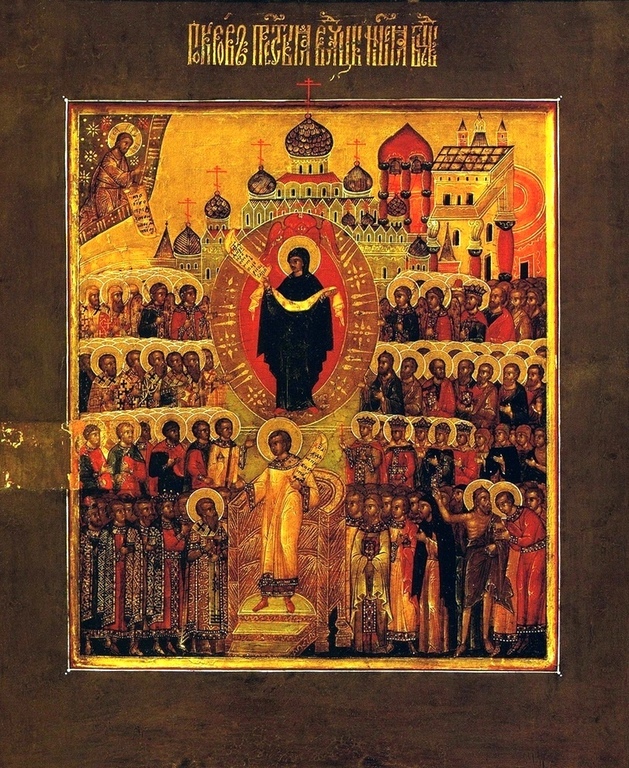
Troparion, Tone 4: Overshadowed by thy coming, O Mother of God, * we, the right faithful people, celebrate today with splendor, * and gazing upon thy most precious image, we cry aloud with compunction: * Cover us with thy precious omophorion, * and deliver us from all evil, * entreating thy Son, Christ our God, ** that He save our souls.
